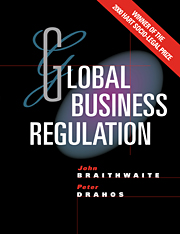6 - The Struggle for a Sovereignty of the People
Published online by Cambridge University Press: 04 August 2020
Summary
Forty-four is a long list of empirical conclusions for readers to remember. Yet the richness of the inductions about the thicket of actors, principles and mechanisms summarized in Tables 20.1 (pp. 476-7), 21.1 (p. 508) and 22.1 (p. 532) sets up a normative conclusion of considerable power and focus. This particularly follows from empirical conclusion number 31 in Chapter 5:
31 There are paradoxes of sovereignty in the growth of global regulation. When national sovereignty and the sovereignty of elected parliaments are eroded, the sovereignty of ordinary citizens is sometimes enhanced.
The very complexity of the webs of actors mobilizing mechanisms of global business regulation enables citizen groups, even individual citizens, to exert genuine influence over globalization. Our data document how entrepreneurship by the weak can prise open conflicts among stronger players, enrolling big business or strategic states in the cause of citizen groups. Modelling, which we find to be the most consistently important mechanism of globalization, is shown in some compelling ways (Chapter 25) to be more useful to the weak than to the powerful. For citizens to assert their sovereignty in the world system, they must understand the formidable array of strategies much more available to big players - from forum-shifting to military coercion to capacity-building. Part III of this book shows that the weapons of the weak are different from those of the strong. When NGOs touch the identities of mass publics and communicate with them through the mass media and the Internet, our data show that they often win. When they turn the strength of the strong against itself (political ju-jitsu) by deft working of epistemic communities, our data show that they often win.
While large corporations and their home governments usually dominate agendas through the formidable set of strategies at their disposal, the significance of epistemic communities in our analysis is that global regulation is surprisingly deliberative. It has to be, because coercion is so often counterproductive. At the end of the twentieth century, for example, political power more effectively comes from the barrel of a gun within states than between them. Although we find that national sovereignty over business regulation is in decline and will continue to decline, Chapter 26 concludes that there is no certainty that globalization will erode the sovereignty of the people conceived in a republican way.
- Type
- Chapter
- Information
- Global Business Regulation , pp. 34 - 36Publisher: Cambridge University PressPrint publication year: 2000
- 1
- Cited by

